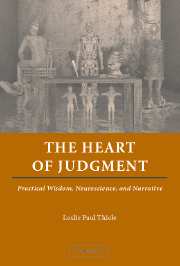Introduction
Published online by Cambridge University Press: 20 July 2009
Summary
Perforce, a political theory is, among many other things, a sum of judgments, shaped by the theorist's notion of what matters, and embodying a series of discriminations about where one province begins and another leaves off … [A] theoretical judgment which, by definition, must discriminate can only be restrained from rendering inappropriate determinations if it is civilized by a meditative culture.
Sheldon WolinEver since Plato first discussed practical wisdom, or phronesis, and Aristotle, his student, raised it to ethical and political preeminence, the faculty of judgment has been an important topic for philosophers and political theorists. Good judgment is no less of a concern for lay people. Today, as in years past, citizens have demanded it of their public officials, as fates and fortunes depend on leaders making prudent assessments and wise decisions in diplomatic, economic, ecological, legal, moral, military, and political affairs. Indeed, citizens consistently deem good judgment one of the most important and essential traits for elected officials and heads of state. Napoleon Bonaparte was half right to insist that “Nothing is more difficult, and therefore more precious, than to be able to decide.” The real difficulty, of course, is to decide well.
In representative systems of government, one might hope, citizens share in the virtue of practical judgment. For Aristotle, the distinguishing mark of a citizen of the polis, or city-state, was “his participation in judgement and authority.”
- Type
- Chapter
- Information
- The Heart of JudgmentPractical Wisdom, Neuroscience, and Narrative, pp. 1 - 16Publisher: Cambridge University PressPrint publication year: 2006

